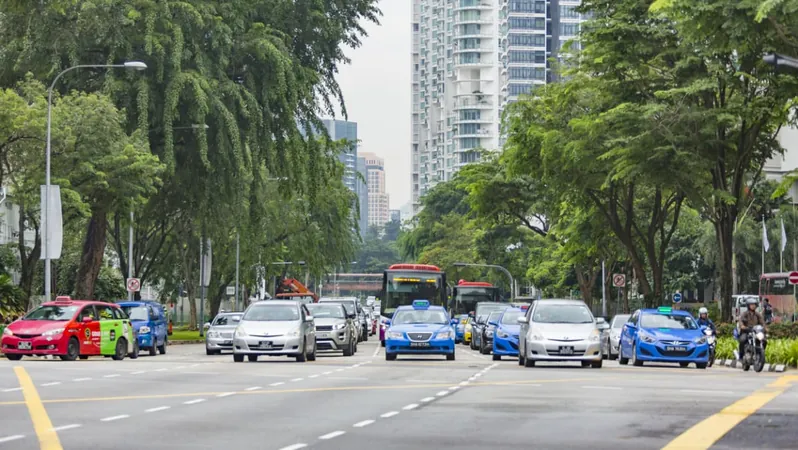
Singapore's Road to a Car-Lite Future: High-Tech Solutions and Smart Policies Set to Tackle Rising Vehicle Numbers!
2024-12-17
Author: Siti
SINGAPORE:
As Singapore braces for an increase in its car population over the next few years, analysts are optimistic about the city-state's ambitious goal of transitioning toward a car-lite society. Advanced technologies and evolving motorist behaviors are believed to be pivotal in managing road congestion effectively.
In a significant policy update, the Land Transport Authority (LTA) announced the introduction of an additional 20,000 Certificates of Entitlement (COEs) distributed across various vehicle categories. This marks the first expansion of the private car population since the last increase between 1997 and 2003, a shift that has raised eyebrows regarding future traffic conditions.
Harnessing Technology for Traffic Management
One key player in this transformation is ST Engineering's cutting-edge traffic management system. Equipped with artificial intelligence, this system can predict traffic congestion up to an hour in advance, by analyzing both real-time and historical data. It provides motorists with timely push notifications on traffic conditions and can even alert emergency services, ensuring rapid response times for any incidents on the road.
Mr. Leong Hin Cheong, Vice President of Mobility Road at ST Engineering, emphasized the interconnectivity of Singapore’s road networks. 'Any accidents or disruption can significantly impact our commute times,' he explained. The technology aims to facilitate smoother journeys, ultimately reducing traffic accidents and carbon emissions—aligning with Singapore’s environmental goals. Notably, a similar system implemented in Dubai has reportedly halved congestion durations and improved emergency responses by up to 30%.
Innovative Payment Solutions to Reduce Traffic
To alleviate road congestion, experts suggest considering a distance-based charging model for car owners. This strategy could discourage unnecessary driving, compelling residents to utilize public transport more frequently or reserve car use for essential trips.
Associate Professor Walter Theseira from the Singapore University of Social Sciences (SUSS) stated, 'A car-lite society doesn't mean denying car ownership; it’s about fostering smart usage patterns that encourage alternatives.' He noted that average vehicle mileage has already decreased, partly due to the increase in hybrid working models post-COVID and enhanced public transport accessibility.
Towards a Sustainable Public Transport Future by 2030
As part of its long-term vision, Singapore is investing billions in upgrades to enhance connectivity and public transport systems, such as expanding MRT lines and bus networks. However, this transformation comes with challenges; Professor Victor Kwan from SUSS warns of the potential for rising public transport fares due to operational costs. This balance is critical for a sustainable public transport infrastructure.
With ongoing plans targeting a greener Singapore, including a requirement for newly registered cars to be environmentally friendly by 2030, the shift towards electric vehicles is already in motion. The development of charging infrastructure is keeping pace with this transition, positioning Singapore closer to its vision of being a sustainable, smart, and connected city.
As the conversation around traffic management evolves, it promises a future where technological advancements and policy reforms ensure that while car ownership may rise, so too will public transport options, creating a harmonious balance for all Singaporeans. Can the tiny island achieve this ambitious goal? Only time will tell!




 Brasil (PT)
Brasil (PT)
 Canada (EN)
Canada (EN)
 Chile (ES)
Chile (ES)
 España (ES)
España (ES)
 France (FR)
France (FR)
 Hong Kong (EN)
Hong Kong (EN)
 Italia (IT)
Italia (IT)
 日本 (JA)
日本 (JA)
 Magyarország (HU)
Magyarország (HU)
 Norge (NO)
Norge (NO)
 Polska (PL)
Polska (PL)
 Schweiz (DE)
Schweiz (DE)
 Singapore (EN)
Singapore (EN)
 Sverige (SV)
Sverige (SV)
 Suomi (FI)
Suomi (FI)
 Türkiye (TR)
Türkiye (TR)